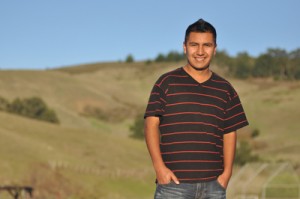Blue cards. Green cards. Congress has not yet passed a comprehensive immigration reform bill, yet Puente has already received plenty of questions from undocumented residents on the South Coast. Many have lived here for decades and are raising children here, sons and daughters who were born in America. They all want legal papers and legitimacy. They want to know how to prepare.
“’Start saving money. Attend English classes. Gather your tax returns.’ That’s what I tell them,” says Puente Program Director Rita Mancera.

If immigration reform occurs this year, Puente expects to see more than a hundred new participants who would need help filing government paperwork.
Fortunately, Puente will be ready to help them. Puente is seeking accreditation from the Board of Immigration Appeals to apply to the government on behalf of users seeking citizenship, not just help people fill out a form. Puente will also be able to represent individuals in immigration court proceedings overseen by the Department of Justice.
The Grove Foundation, the primary funder of Puente’s immigration paperwork services, supported the changes. Puente’s new status will give the organization a whole new level of credibility in the community, says Mancera.
“It’s going to be clear to everyone that they can get services from the people that they trust,” she says. “They know we do things in a very honest way.”

Locally in Pescadero, the most popular component of the Senate immigration bill is the Blue Card program, under which longtime agricultural workers would have the opportunity to get legal status if they pass a background check and pay a fine. Eventually, an agricultural worker could apply for a green card. The proposal has broad support from farmers and ranchers.
Puente is already in talks with sister organizations about the best way to anticipate what may be coming next. Eventually, Mancera predicts that Puente would also need to expand its citizenship-tutoring program. Instead of one-on-one, Puente would probably hold citizenship classes and tie them into Puente’s adult English language program.
How low-income applicants would be able to afford the government application fees – thousands of dollars – remains a big question.
Lobel says federal changes are way overdue. Puente has already seen how DACA (President Obama’s deferred action program) has changed the lives of 18 young people who now have legal papers that allow them to work, study, and get a driver’s license. She’s hoping new legislation would give their siblings and parents a similar opportunity.
“People know that it’s a long path – the question is having a path. Right now we’re on a long path to nowhere,” says Lobel.
